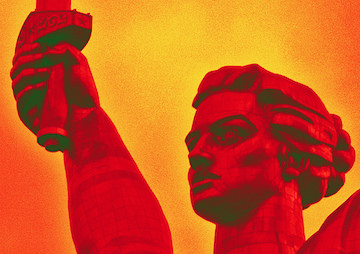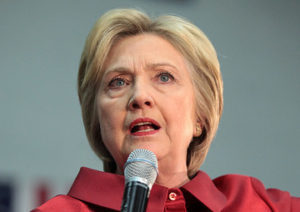The Fight Against the ‘Former People’ of the Yanukovych Regime
I would love to believe this wonderful story of how a new, democratic Ukraine is fighting against an old, authoritarian bureaucracy, but there are too many indications that this story is flawed. The Motherland Monument in the Ukrainian capital, Kiev. (anthonystanley (CC BY-SA 2.0))
The Motherland Monument in the Ukrainian capital, Kiev. (anthonystanley (CC BY-SA 2.0))
By Halyna Mokrushyna, CounterpunchThis piece first appeared at CounterPunch.
Halyna Mokrushyna is currently enrolled in the PhD program in Sociology at the University of Ottawa and a part-time professor. She holds a doctorate in linguistics and MA degree in communication. Her doctoral project deals with the memory of Stalinist purges in Ukraine. In the summer of 2013 she travelled to Lviv, Kyiv, Kharkiv and Donetsk to conduct field research.
As my recent article on the attempts to dislodge the head of the National Cancer Institute of Ukraine in Kyiv was about to be published in Counterpunch, a colleague drew my attention to an article on the same subject which was published almost simultaneously in the The Guardian. I began to write a commentary on the biased and prejudiced style of the Guardian article. But the events of February 16 have changed my article’s focus.
Professor Ihor Shchepotin was given a notice of dismissal on February 16 right in the surgery room as he was preparing to operate on a patient laying on the operating table under anesthetic. A group of people headed by a Dr. Semivolos from the Institute burst into the room and informed the professor that he was dismissed and should quit the room. He was forced to leave, while the patient remained on the table.
When contacted by UNN News by phone, Prof. Shchepotin confirmed what happened to him that day. “My contract as the director of the Institute expired on February 11. However, I still remain the head of the department of abdominal swelling of the Institute,” he said. “That is why I went into the surgery room to do my job – to save people’s lives.
“It was like a stage setting… It’s a pity that those who wanted so much to dismiss me from the directorial position could not care less about people’s lives.”
The story of Prof. Shchepotin’s dismissal started many months ago. Before I begin to unravel it, let me remind you that Professor Igor Shchepotin is a world-renowned surgeon-oncologist and a member of numerous international organizations. He has published 600 scientific papers and 300 articles. On February 11, the International Association of Surgeons, Gastroenterologists and Oncologists (IASGO), of which Mr. Shchepotin is a member, sent a letter to Ukrainian Minister of Health O. Kvitashvili in support of the professor’s work. “Thanks to his efforts, Ukraine has become known in the domain of oncology throughout the world. Ukraine is a member of many international and professional associations… We were honored to have Mr. Shchepotin as a chair of a panel during the last World Congress of the IASGO in Vienna in 2014. Mr. Shchepotin is a prominent and world renowned surgeon-oncologist.”
How is it possible that a doctor with such a reputation was so theatrically pushed out of an operating room of the institute he used to lead and was fired without notice? It all started when a new Ukrainian government, formed as a result of a coup d’état last year, appointed several people from the Euromaidan protest movement to ministerial positions, as a way to recognize ordinary Ukrainians’ contribution to the overthrow of the “criminal” regime of former president Viktor Yanukovych.
Oleh Muisy, a Western Ukrainian and doctor by profession, who was a volunteer for the Euromaidan protests treating and assisting injured people, was appointed Minister of Health after the victory of the Euromaidan. Right from the start, he embarked on a mission to eradicate corruption in the Ministry and in the health care system overall of Ukraine. He fired most of the high-level executives in the Ministry under the pretext that they were appointed by the former regime and were plundering public money. He also blamed his first deputy minister for failing to organize in a timely manner tenders for purchasing drugs. Not surprisingly, his deputy minister was also from the previous ministry. But Muisy’s carreer ambitions hit a wall on October 1, 2014, when Prime Minister Yatseniuk fired him “in relation to an unsatisfactory state of realization of the program of drug purchases”. In response, Musiy called Yatseniuk’s government a “modernized version of Yanukovych’s regime”.
Back at the National Cancer Institute, its director, Prof. Igor Shchepotin, was also seen by Musiy as part of the corrupted bureaucratic apparatus of the ancien régime which had to be cleansed. Musiy had an ally within the Institute – another activist of Euromaidan, Doctor Andrei Semivolos. After the victory of Euromaidan, Semivolos decided to undertake a revolution in the Institute. He found a dozen like-minded persons within the Institute, mostly young professionals, and launched an internal battle for control. In June of 2014, they founded a so-called “independent” trade union which, they claimed, represents the interests of the collective of workers of the Institute. However, the Institute already has a primary trade union organization, with over 900 members. According to the statute of the Institute and the collective agreement with its employees, only this organization can represent the rights and interests of the Institute employees.
On November 13, the established trade union sent a letter to the then-interim minister of health care of Ukraine in which they complained that the “independent” trade union organization is illegitimate and does not have a right to speak on behalf of all workers. The letter also stated that the main goal of this “independent” union was to destabilize the work of the Institute by initiating investigations on specious grounds and spreading false or misleading information about the Institute in press and social media, all with a goal to replace its director. Members of the established union also stated in their letter that Semivolos, on behalf of this “independent” trade union, had sent a letter to the Ministry of Health asking that Volodymyr Mishalov be appointed a new director. The problem with Volodymyr Mishalov is that he is a cardiologist by profession and therefore cannot lead an Institute specializing in cancer treatment. Mishalov also happens to be a husband of Kateryna Amosova, the new head of the Bohomolets National University of Medicine in Kyiv. This lady also came to power on the wave of the Euromaidan revolution, proclaiming herself rector after the then-rector, Vitaliy Moskalenko was forced to sign a letter of resignation under the pressure of a group of students led by deputies from the opposition. Later, Musiy, as a new minister of health, confirmed her action by officially appointing her to the position as rector.
On May 28, 2014, workers of the Cancer Institute protested at the entrance to the building of the Ministry of Health against endless verifications and audits of their work taking place. Doctors held banners saying “Ministry of Health, stop your verifications! Let us work!” Around 30 employees of the Institute took part in the protest. When asked by a journalist why the employees were protesting, Semivolos replied that some of people did not really care about the issue while others worked in Shchepotin’s department and therefore depended on him to keep their jobs.
Semivolos and his supporters also organized a protest in front of the Ministry of Health, on June 18, demanding a purging of the Ukrainian health care system and the dismissal of Shchepotin. Because this is a new generation of revolutionary Ukrainian intelligentsia, they approached the protests creatively. They placed live crayfish on a map of Ukraine as a metaphorical representation of cancer spreading throughout Ukraine because of the corruption of its oncologic health care system. The word rak in Ukrainian means both cancer and crayfish.
I would love to believe this wonderful story of how new, democratic Ukraine is fighting against a deeply rotten, authoritarian Ukrainian bureaucracy, but there are too many indications that this story is flawed.
First, the means by which new Ukrainian democrats are cleansing the system of the “collaborators” of the old regime are dubious, to say the least. For instance, when in December 2014, Shchepotin returned after a four-month, forced medical leave, a deputy of the Verkhovna Rada (Parliament), Serhiy Kaplin, accompanied by a crew of cameramen from a TV program with the very telling name “People’s Office of Public Prosecutor”, burst into Shchepotin’s office and started interrogating him in front of cameras. Kaplin demanded that Shchepotin explain what he was doing in his office and why he had not yet written a letter of resignation. Kaplin threatened that he would broadcast a television report that would bury Shchepotin’s reputation “as an oncologist and as a personality”. Kaplin ordered Shchepotin to gather his stuff and get out of the office.
The employees of the National Institute of Cancer were shocked by this vigilante justice and wrote a letter to the speaker of the Ukrainian Parliament, Volodymyr Groisman, stating that Kaplin had used his position as a Rada deputy to carry out a political act against the Institute for his own lucrative impulse. Otherwise, why would he behave in such an indecent and immoral manner, unbecoming to the civilized world? The union of workers at the Institute asked Groisman to hold Kaplin to account for his breach of Ukrainian law.
When Semivolos staged his June 18 protest in front of the Ministry of Health, there were around 20 people with him. On February 4, 2015, World Cancer Day, the employees of the Institute took to the streets protesting against the announced cuts to Institute’s financing and the plans to replace Shchepotin as the director. Their protest was much more numerous compared to anything that Semivolos’ group had ever staged. The employees also demanded that a new director be selected through an open competition. In my previous article, I wrote that in the new version of the collective agreement, a director is appointed by the Ministry of Health. This version was ratified by Minister of Health Kvitashvili. No representative of the Institute has signed it because it was prepared secretly by the Minister and sent to the Institute only as a matter of notification. This provoked much anger in the trade union of the Institute. The union members sent a letter to Kvitashvili asking to explain these changes in the Statute and requesting a meeting with him.
I do not know whether Minister Kvitashvili found time to meet with the employees of the Institute. Right now, another professor of the Institute, Kolesnik Olena, is acting director until “a new director is appointed according to the procedures established by the law”. There are rumors that the candidature of the new director has been already chosen – no surprise here, it is Volodymyr Mishalov, who I have mentioned already.
We will have to wait and see who will be finally “appointed” a new director. According to the statute, agreed between the Ministry of Health and the union of employees of the Institute, there is an obligation to hold an open competition, run by a committee of experts from inside and outside the Institute. A question that bothers me is this: the Ministry of Health would have known that Professor Shchepotin’s contract as the head of the Institute would expire on February 11, so why did it not begin the process of finding a new candidate in advance?
This is one of the examples of the implementation of the lustration (cleansing) law, adopted by the Verkhovna Rada in October of 2014. This law provides for investigations and dismissals of civil servants deemed to have “contributed to the usurpation of power by Viktor Yanukovych” and those who held leading positions in the ruling Communist Party and Komsomol youth organizations during the Soviet Union (pre-1991). The law has been criticized by the European Commission for Democracy through Law for not living up to European principles.
In the ‘revolutionary’ upsurge for justice, Euromaidan Ukrainians are unreflectively smashing the old regime. They are in the definitive minority, as the story with Shchepotin shows. There are many more Ukrainians disagree with crusades against alleged injustices compared to those who agree.
No reform can be implemented if it is carried out in a non-transparent and partisan way. Moreover, the system resists, and rightly so. Yes, it is corrupted, but not in the irrevocable and disastrous way, which The Guardian strongly implies (I will return in another article to The Guardian’s claim). New reformers, instead of succumbing to the automatic reflex of Ukrainian power-holders to indiscriminately cleanse the bureaucracy top to, should examine in an objective and open manner the qualifications and characteristics of civil servants, including taking into account the opinions of people about their managers. But I doubt that the reformers will proceed in such a manner. The actions of the new Kyiv power-holders resemble more the settling of scores, not honest attempts at reforms. In an ironic way, Musiy was right: Prime Minister ArseniyYatseniuk’s present government is a modernized version of Yanukovych’s regime. The Euromaidan revolution has not changed a lot in that sense.
The question that I ask myself – could Ukrainians radically change their governing system from top to bottom? And is it really necessary? By implementing radical reforms, you are at great risk of destroying the whole system. But a government has a duty to provide health care, feed the population, secure the normal functioning of the state apparatus etc… It is better to keep what is right in that system and to change what is wrong. You can reform it step by step. Small steps, not gigantic ones, as Euromaidan demanded but seems incapable of implementing.
Your support is crucial…With an uncertain future and a new administration casting doubt on press freedoms, the danger is clear: The truth is at risk.
Now is the time to give. Your tax-deductible support allows us to dig deeper, delivering fearless investigative reporting and analysis that exposes what’s really happening — without compromise.
Stand with our courageous journalists. Donate today to protect a free press, uphold democracy and unearth untold stories.









You need to be a supporter to comment.
There are currently no responses to this article.
Be the first to respond.